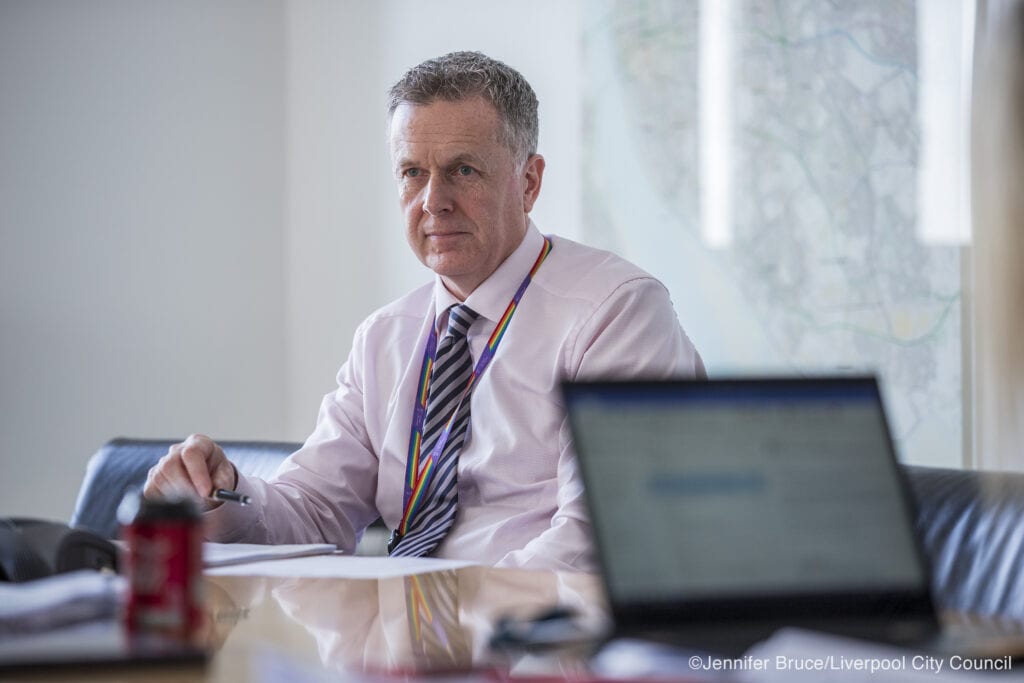Tony Reeves, chief executive of Liverpool City Council: ‘Liverpool will come back stronger than ever’
Liverpool’s economy will be quickly “out of the traps” when the country begins to emerge from lockdown, the chief executive of Liverpool City Council says.

Tony Reeves, chief executive of Liverpool City Council.
Tony Reeves said the city’s ‘Operation Greyhound’ plan was being devised to help get businesses up and running as soon as possible. He added: “We want to demonstrate to investors that we are open for business.”
Taking part in a webinar organised by business lobby group, Downtown in Business, Mr Reeves delivered an upbeat message on the city’s recovery prospects and also paid tribute to the work of thousands of council staff, whom he said had been “magnificent” during the coronavirus crisis.
He said: “Our council staff have been brilliant. They have been volunteering for things well out of their comfort zone. I am so proud of them.”
In conversation with DLIB chief executive, Frank McKenna, Mr Reeves said the council was looking to minimise the damage to Liverpool’s visitor economy and hospitality sector which he said had been “knocked sideways” by the epidemic.
The council has already processed claims totalling more than £270m in Government coronavirus support. In particular, hospitality businesses with a rateable value up to £51,000 have been able to apply for grants of £10,000 or £25,000.
He explained: “I really believe the tourism sector will come back but it will take time. We have some great businesses here. We have legions of small businesses that have driven our economy over the past few years. We have some really strong ideas about how we can use public space to allow restaurants to offer more covers, for example. We need step up and provide some kind of release for those businesses.”
Mr Reeves said the council was talking to Government to set up a discretionary support scheme for small businesses in the next few days, initially worth around £6m to £7m. He added: “We know that cash is king and we need to get that liquidity into businesses.
“A lot of people talk about the big events will not come back or we will no longer go to restaurants or nightclubs. I don’t believe that. We will do all of those things again… the fundamentals of Liverpool as a visitor destination are strong and I believe those visitors will come back.”
Mr Reeves also echoed the comments of leading Liverpool academic Professor Michael Parkinson who said the knowledge economy would play a much bigger role in the city’s economy over the next few years.
He referred to Bruntwood’s £12m investment into Sciontec Liverpool, which includes Liverpool Science Park, last week as evidence of the appeal of the sector to investors. He also talked about the emerging Knowledge Quarter developments in Paddington Village.
“Liverpool’s knowledge-based assets and businesses are the most adaptable to change and they can help us get the economy moving again as quickly as possible,” he said. “There are absolutely massive opportunities for Liverpool to collaborate with Manchester’s Oxford Road Corridor (an innovation district). That could be a world-beating collaboration and we should grab it with both hands.”
He said it was vital the Government delivered the right strategy for minimising the risk of a second COVID-19 spike, adding: “If we don’t get the health outcomes right then we will not be able to get the economy right – and people will suffer.”
But he concluded on an upbeat note, saying: “Scousers are a resilient bunch and are optimistic – and if we can’t come back from this, then I don’t know who can.”
